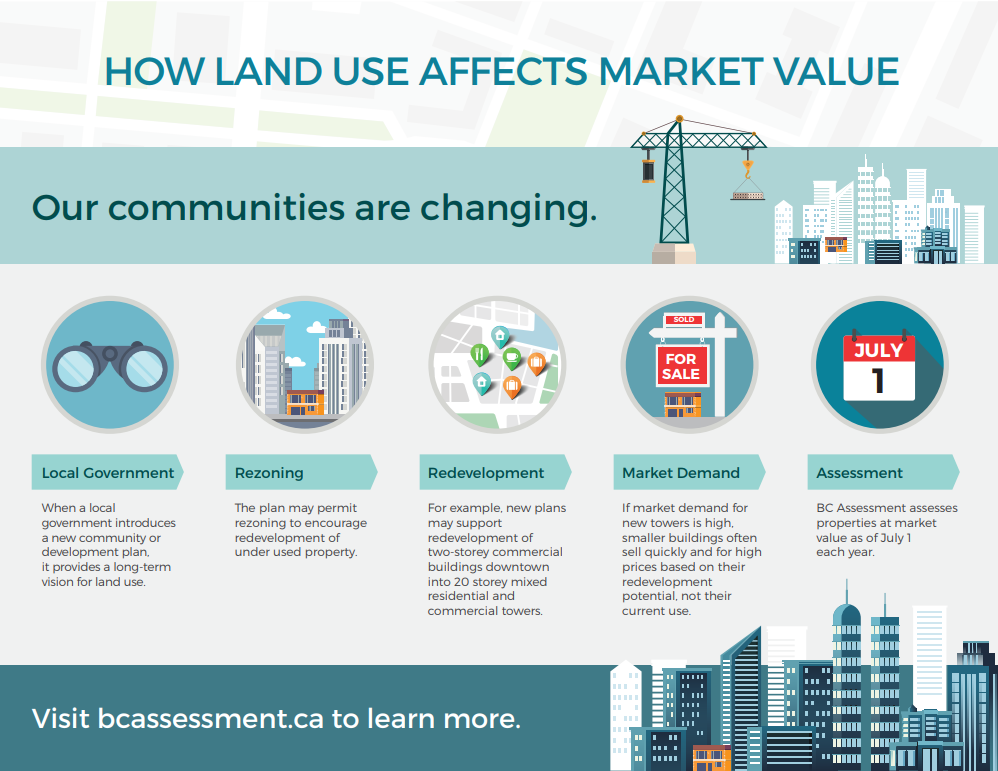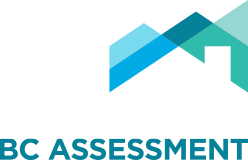BC Assessment provides a stable base for property taxation in British Columbia. To meet its mandate, BC Assessment completes a property assessment for over 2 million properties in B.C. every year.
BC Assessment mails individual assessment notices to all property owners in the province, and presents the assessments to various tax jurisdictions: municipal governments, regional districts and the Ministries of Education and Health. Our property assessments provide the foundation to raise billions of dollars in property tax revenues each year. In turn, this helps fund the many community services provided by local governments as well as public education and health care.
How we assess properties
BC Assessment estimates the assessed value of most properties (e.g. residential homes and industrial, commercial and investment properties) as of
July 1 each year. Each January, your annual assessment notice provides an assessed value based on the market value that your property would have sold for on or about the previous July 1.
 Learn more about BC Assessment's key dates
Learn more about BC Assessment's key dates
Transcript:
How BC Assessment Assesses Properties
In determining the assessed value and the property type, our appraisers may give consideration to:
- present use,
- location,
- original cost,
- replacement cost,
- revenue or rental value,
- selling price of the land and improvements and comparable land
- improvements, economic and functional obsolescence
- and other circumstances affecting the value of the land and
improvements.
Appraisers also consider a wide variety of physical factors such as size, age, quality and condition of the improvements (buildings) as well as location, availability of services, shape and topography of the land.
Assessment and classification
How BC Assessment values and classifies these common property types:
Understanding market value
The supply of properties available for sale and demand from willing buyers affects the rate of change in market values. Market values typically increase during a seller's market, where supply is low and demand is high. On the other hand, market values typically decrease during a buyer's market, where supply is high and demand is low. Market values are stable where supply and demand are balanced.
Changes to properties including new construction, renovations, property classification and eligibility for an exemption are also reflected on the annual property assessments.
Appraisers look to the market to determine the market value of a property. Only comparable sales within a market area that have similar potential uses are considered and analyzed.

Learn more on the:
The Local Government Act (LGA) provides direction and guidance to local governments as to adopting an official community plan (OCP). An OCP is a document containing objectives and policies used to guide local governments with decisions on planning and land use management. The LGA states that an OCP is equal to an official development plan under the
Vancouver Charter. OCP's provide guidance on land use (e.g. zoning by-laws) and building densities within specified areas in a community. Local governments may introduce or update an OCP as part of a strategy to change the patterns of land use based on a community's needs. OCPs help to create a variety of desired uses to enhance community aesthetics, revitalizing a specific area, and/or improving the links between community and transportation networks.
If an OCP is adopted or updated, BC Assessment reviews market evidence to determine any impact on the market value of affected properties. Our appraisers will review comparable market sales to determine any impact on market value.
The following are important considerations when determining the impact on market value of OCP amendments:
- What is the impact of the OCP amendment on the market value of affected properties?
- Does the amended OCP support rezoning that will impact permitted uses and/or density for development for affected properties?
- Does the market show demand for properties with amended OCP designations?
- Do comparable sales indicate the OCP has had an impact on the market value of the properties?
The same analysis applies if a local government grants a rezoning to a property which changes the land use (such as permitted uses and/or density of development).
Official Community Plans (OCPs) provide direction as to the potential uses, potential density, building height guidelines, etc. Zoning designations provide more detailed, site-specific land uses including primary and secondary permitted uses, allowable density, maximum site coverage, building setbacks, parking requirements, etc.
In the event that a property is rezoned, BC Assessment must review market evidence and determine any potential impact to the assessed value as well as property classification. Should the evidence indicate there is an impact on value or a change in permitted use regarding classification, our appraisers will review comparable sales and permitted use to determine the impact to the market value as of July 1.
Vacant land that is rezoned from residential to commercial may see the property classification changed following the Prescribed Classes of Property Class Regulation.
The following are important considerations when determining the impact on market value of rezoning:
- What is the impact of the rezoning on the value of the property?
- What is the classification of the property following rezoning?
- Does the new zoning (e.g. permitted uses and density) affect the development potential?
- Does market evidence indicate if there is demand for the rezoned property?
- Do comparable sales indicate the rezoning has had an impact on the market value of the property versus its current use?
Our information
BC Assessment maintains an extensive and up-to-date information database on all properties in British Columbia. Public access to this electronic database is available through our
online assessment search service.

